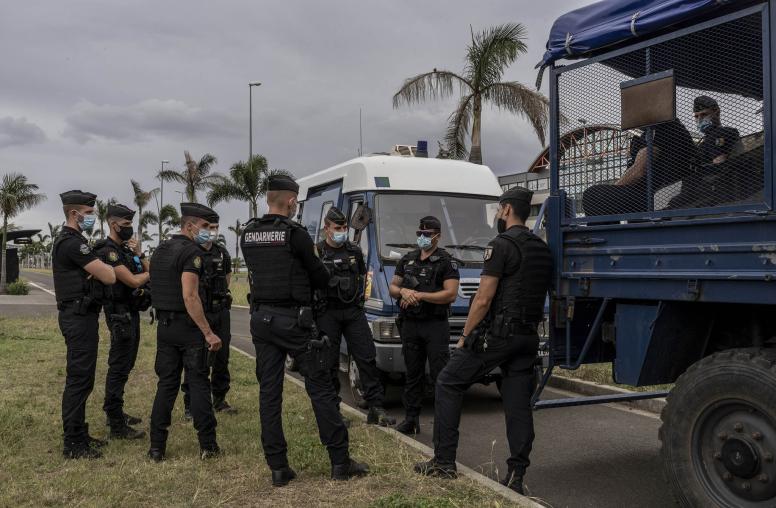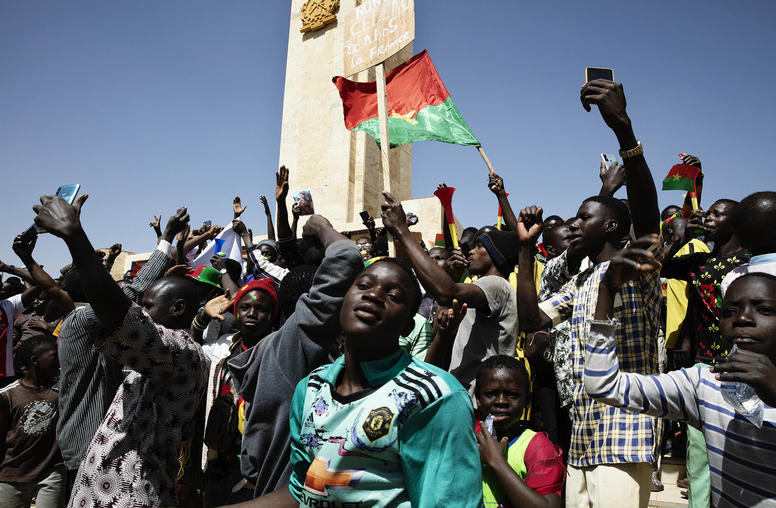Missing Peace Global Symposium on Conflict-Related Sexual Violence
Taking Action Together with Survivors, Policymakers, Practitioners and Scholars
Download AgendaFrom past conflicts in Vietnam and Bosnia and Herzegovina to today’s conflicts in Ukraine, Ethiopia, Sudan, Democratic Republic of Congo, Colombia and Myanmar, state and nonstate actors have used sexual violence to intimidate and terrorize populations. What is missing from policy, research and practice to deter conflict-related sexual violence, mitigate ongoing harms, and heal from the intergenerational impacts? What are the implications for peace and global security when action falls short? These are among the questions at the forefront of the Missing Peace Initiative.
Please note: Full recordings of the plenary sessions can be viewed in the agenda below.
From November 1 to 3, USIP, the Peace Research Institute Oslo, Washington University in St. Louis, and Women in International Security hosted the 10th anniversary Missing Peace Global Symposium. This symposium brought together leading researchers from diverse disciplines, survivors of different conflicts, practitioners, and policymakers to advance a multi-pronged approach to ending the atrocity of conflict-related sexual violence.
Continue the conversation on social media using the hashtags #USIPWomenPeaceSecurity and #MissingPeaceInitiative.
Agenda
Note: All times are EDT
Day One: Wednesday, November 1
9:00am - 10:45am EDT | Making Policy Count to End Conflict-Related Sexual Violence: Progress and Barriers
The past decade has brought impressive growth in research, policy and practice focused on conflict-related sexual violence. Yet implementation of key policies remains inconsistent in many areas. In this opening plenary, experts shared their perspectives on areas of progress, implementation challenges and persistent knowledge gaps.
Welcome & Keynote Remarks
- Lise Grande, welcoming remarks
President, U.S. Institute of Peace - The Honorable Pramila Patten, keynote remarks
U.N. Special Representative of the Secretary-General on Sexual Violence in Conflict - Ambassador Geeta Rao Gupta, keynote remarks
Ambassador-at-Large for Global Women's Issues, U.S. Department of State
Panel Discussion
- Tonderai Chikuhwa, Senior Policy Advisor, U.N. Office of the Special Representative of the Secretary-General on Sexual Violence in Conflict
- Kolbassia Haoussou, Director of Survivor Empowerment, Freedom from Torture and Survivor Champion, U.K. Preventing Sexual Violence in Conflict Initiative
- Ambassador Beth Van Schaack, Ambassador-at-Large for Global Criminal Justice, U.S. Department of Justice
- Margot Wallström, Former U.N. Special Representative of the Secretary General on Sexual Violence in Conflict and former Minister of Foreign Affairs of Sweden
- Kim Thuy Seelinger, co-moderator
Senior Coordinator for Gender-Based Crimes and Crimes Against Children, International Criminal Court Office of the Prosecutor and Research Associate Professor and Director, Center for Human Rights, Gender and Migration, Washington University in St. Louis - Kathleen Kuehnast, co-moderator
Director, Women, Peace and Security, U.S. Institute of Peace
1:20pm - 2:30pm EDT | Creating Bridges Between Research, Policy and Practice to Address Conflict-Related Sexual Violence
What kind of policy problem is conflict-related sexual violence? How we answer this question has implications for the solutions proposed. Panelists shared their perspectives on what different research disciplines can contribute, what policymakers and practitioners need from researchers, and how research, policy and programming can be bridged to better address conflict-related sexual violence.
- Brahmy Poologasingham, Lead, Transitional Justice Programs, U.S. Department of State, Bureau of Democracy, Human Rights, and Labor
- Philipp Schulz, Post-Doctoral Researcher, Institute for Intercultural and International Studies, University of Bremen
- Payal K. Shah, Director, Program on Sexual Violence in Conflict Zones, Physicians for Human Rights
- Elisabeth Jean Wood, Professor, Department of Political Science, Yale University
- Dara Kay Cohen, moderator
Professor, John F. Kennedy School of Public Policy, Harvard University
4:20pm - 5:30pm EDT | Lessons on Wartime Sexual Violence from Different Conflicts
The incidence of conflict-related sexual violence varies between conflicts and even within conflicts, and so do responses to this violence. What can be learned from different conflicts around the world and what are the implications for policy, research and practice?
- Ali Bitenga Alexandre, Researcher, Panzi Foundation, Democratic Republic of Congo
- Sofia Kornieva, Human Rights Lawyer, Ukraine Law Advocacy Group
- Wai Wai Nu, Founder, Myanmar Women’s Peace Network and Justice for Women
- Rosa Emilia Salamanca, Executive Director, Corporación de Investigación y Acción Social y Económica, Colombia
- Chantal de Jonge Oudraat, moderator
Member of Board of Directors, Women In International Security and Global Fellow, Wilson Center
Day Two: Thursday, November 2
9:00am - 10:15am EDT | Survivor-Centered Approaches to Address Conflict-Related Sexual Violence
Conflict-related sexual violence aims to dehumanize survivors through calculated acts of cruelty to render survivors and their communities powerless. Survivor-centered approaches to policy, programming and research are expanding, yet there is a need for a clearer understanding of what a survivor-centered approach to addressing conflict-related sexual violence means and how to implement it.
Video Remarks
- Duchess of Edinburgh Sophie Helen Rhys-Jones, Champion of Women, Peace and Security Agenda
Panel Discussion
- Artemis Akbary, Founder and Executive Director, Afghanistan LGBTIQ+ Organization
- Lejla Damon, Member, Forgotten Children of War Association, Bosnia and Herzegovina
- Jayne Flemming, Director, International Refugee Program, Reed Smith LLP
- Nadine Tunasi, Coordinator, Survivor Speak Out, Freedom from Torture and Survivor Champion, U.K. Preventing Sexual Violence in Conflict Initiative
- Kolbassia Haoussou, Director, Survivor Empowerment, Freedom from Torture and Survivor Champion, U.K. Preventing Sexual Violence in Conflict Initiative
- Kim Thuy Seelinger, moderator
Senior Coordinator for Gender-Based Crimes and Crimes Against Children, International Criminal Court Office of the Prosecutor and Research Associate Professor and Director, Center for Human Rights, Gender and Migration, Washington University in St. Louis
1:00pm - 2:20pm EDT | Integrating Conflict-Related Sexual Violence Across Policy Agendas
Conflict-related sexual violence displaces people, destroys communities, silences victims and warns of wider atrocities. It undermines reconciliation efforts and the transition to more secure and peaceful societies. Yet, opportunities to integrate prevention and mitigation efforts and jointly leverage resources continue to be missed. How can we effectively move beyond policy siloes that continue to limit action against conflict-related sexual violence?
Keynote Remarks
- Assistant Secretary Anne Witkowsky, Bureau of Conflict and Stabilization Operations, U.S. Department of State
Panel Discussion
- Andrea Freeman, Deputy Director, Office of Sudan and South Sudan Programs, Bureau for Africa, U.S. Agency for International Development
- Ambassador Makila James, Senior Advisor, U.S. Institute of Peace
- Emily Kenney, Policy Specialist, Rule of Law and Transitional Justice, U.N. Women
- Siobhán Mullally, U.N. Special Rapporteur on Trafficking in Persons, Especially Women and Children
- Robinah Rubimbwa, Founder and Executive Director, Coalition for Action on Resolution 1325, Uganda
- Ambassador Melanne Verveer, moderator
Executive Director, Georgetown Institute for Women, Peace and Security
4:15pm – 5:25pm EDT | Key Takeaways for Research, Policy and Practice to End Conflict-Related Sexual Violence
Panelists reflected on the past decade of global efforts to address conflict-related sexual violence and the key messages from two days of discussion among global experts at this symposium.
A Retrospective
- Margot Wallström, Former U.N. Special Representative on Sexual Violence in Conflict and former Minister of Foreign Affairs of Sweden
Panel Discussion
- Mayesha Alam, Vice President of Research, Foreign Policy Analytics
- Victor Madrigal Borloz, U.N. Independent Expert on Protections Against Violence and Discrimination Based on Sexual Orientation and Gender Identity
- Natalie Smith, Head, Prevention of Sexual Violence in Conflict Initiative Team, U.K. Foreign, Commonwealth and Development Office
- Nadine Tunasi, Coordinator, Survivor Speak Out, Freedom from Torture and Survivor Champion, U.K. Prevention of Sexual Violence in Conflict Initiative
- Ambassador Melanne Verveer, Executive Director, Georgetown Institute for Women, Peace and Security
- Margot Wallström, moderator
Former U.N. Special Representative on Sexual Violence in Conflict and former Minister of Foreign Affairs of Sweden
Day Three: Friday, November 3
10:00am - 11:30am EDT | Taking Action Through the Arts to End Conflict-Related Sexual Violence
From film to poetry, dance to music, the arts offer important approaches to addressing conflict-related sexual violence that policy briefs and academic papers cannot.
Recitation
- Pádraig Ó Tuama, Poet in Residence, Center for Cooperation and Conflict Resolution, Columbia University
Panel Discussion
- Ryan D’Souza, Curator, Nobody’s Listening Exhibition
- Neloufer de Mel, Chair Professor, Department of English, University of Colombo, Sri Lanka
- Pádraig Ó Tuama, Poet in Residence, Center for Cooperation and Conflict Resolution, Columbia University
- Nayanika Mookherjee, Professor, Department of Anthropology and Co-Director of Institute of Advanced Study, Durham University, United Kingdom
- Leslie Thomas, Producer, MIRA Studio and ART WORKS Projects
- Megan Beyer, moderator
Director, Office of Art in Embassies, U.S. Department of State



